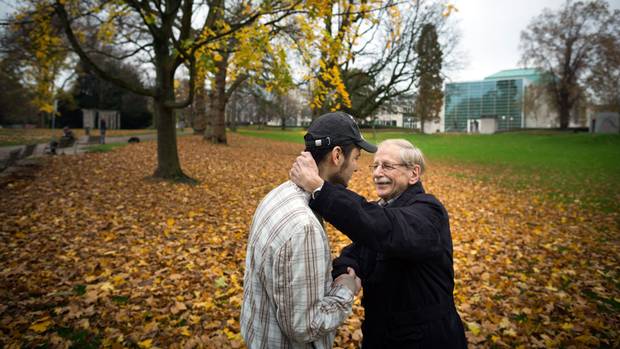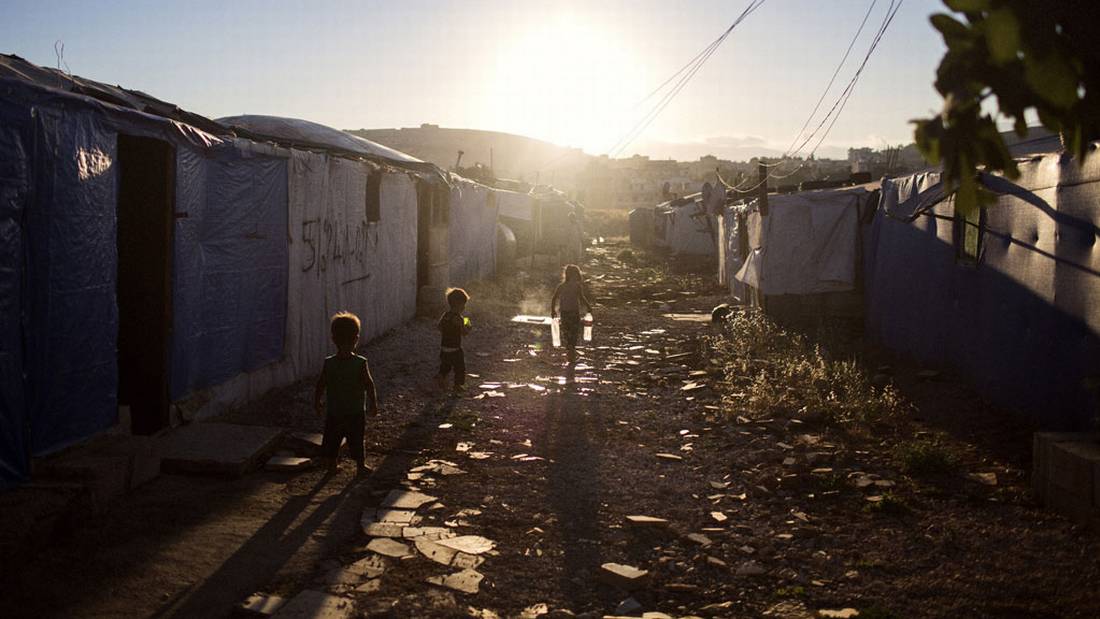Early in September, Khaled Allak and five friends were lost in an endless forest. It was late at night and they had no food or water; their phone batteries had been dead for hours. Earlier that day, the six Syrian refugees had escaped from a train that Hungarian police were blocking from continuing west. Now their only goal was to keep going in that direction – toward the border with Austria, and then on to Germany.
About 1,000 kilometres to the northwest, Max Saschowa was sleeping in his home in the tiny German village of Kaulhausen. Mr. Saschowa and his wife Brigitte, both retired, had passed the day in a variation of their regular routine. He tinkered with projects – restoring a 24-year-old car, repairing engines – while she helped her disabled sister and participated in a local bowling league.
Within weeks, these lives would intersect. Mr. Allak, 22, and Mr. Saschowa, 75, have more in common than it first appears. The fact of their meeting shows the unexpected ways in which the refugee crisis is reaching into every corner of Germany, from large cities to mid-sized towns to tiny hamlets. And it illuminates the long road that stretches ahead as refugees adapt to a new country and Germans adjust to their presence.
The process is the source of growing unease for some Germans. Chancellor Angela Merkel has faced calls from conservative allies and from members of her own party to adopt a tougher stance toward the refugee influx, which she has resisted for the most part.
Now the consequences of that policy are unfolding at the level of individual lives. Mr. Allak ended up just down the road from Mr. Saschowa in the village of Loevenich. It hasn't seen groups of refugees since the Second World War and is housing the new arrivals in dormitories belonging to a local strawberry and asparagus farmer. "You read about what's happening in Hungary, in Austria – it's so far away," says Mr. Saschowa. "Then you learn they're right here."
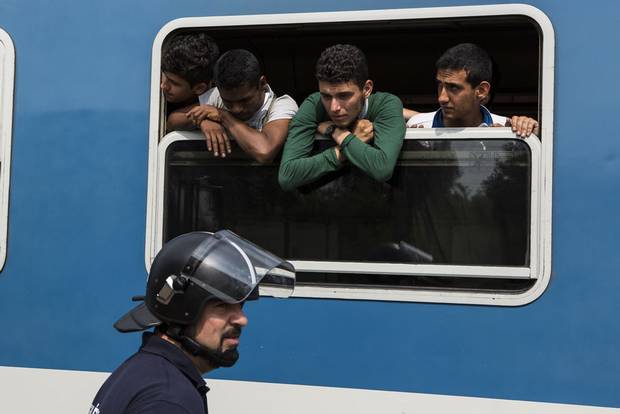
Syrian refugee Khaled Allak leans out of a train window on Sept. 3, 2015 while en route from Budapest, Hungary to a refugee camp in Bicske. After learning the train was not going to Germany as hoped, Mr. Allak and other young Syrians escaped from the train and trekked over land to Germany.
David Maurice Smith/for the Globe and Mail.
3,700 Kilometres From Home
It's a cold, wet evening in October and Mr. Allak is standing in a field wearing flip-flops and a thin jacket. Green fields and grey skies stretch to the horizon. There are wind turbines in the distance. It feels a world away from Syria – 3,700 kilometres to be precise, says Mr. Allak, an aspiring engineer who has calculated the distance from his hometown near Idlib.
Nearby sit two low-slung dormitories. Normally they house the workers who harvest the surrounding fields, but since the end of the summer they have been home to 150 asylum seekers. Inside, the rooms are basic – cots, lockers, a table – but there is heating, hot water and electricity, all luxuries that Mr. Allak hasn't had for more than a year back in in Syria.
Here his life follows a new pattern: three meals a day, served in an unheated annex between two buildings and eaten in his room. Sometimes there's a game of soccer or ping pong outside, or at least there was before the weather turned cold. And he spends hours poring over his smartphone, getting updates from home or watching German lessons on YouTube. Mr. Allak is an assiduous student: In a notebook, he has carefully filed 500 German words that he is translating into English and Arabic.
Like many before him, he marvels at the German language's propensity for compound nouns. There's one in particular that consumes him: Familienzusammenfuehrung, or family reunification. He wants to start that process as soon as possible to bring his parents and three brothers to Germany. But first, he needs his own application for asylum to be approved. And for now, it hasn't even formally begun – the German system for registering refugees is swamped by the wave of arrivals, with more than 400,000 entering the country in September and October.
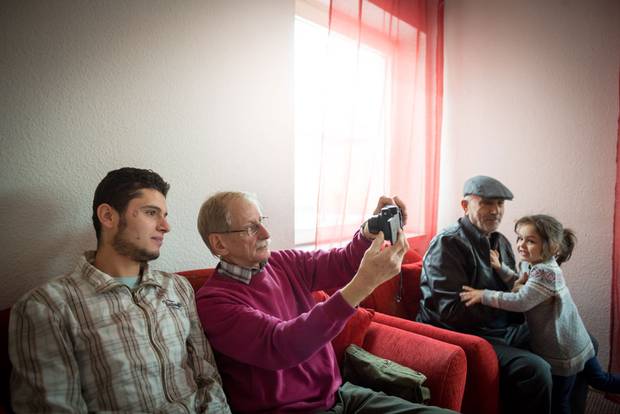
Mr. Allak ended up just down the road from Mr. Saschowa in the village of Loevenich and is staying in dormitories belonging to a local strawberry and asparagus farmer.
GORDON WELTERS/FOR THE GLOBE AND MAIL
When the Syrian civil war broke out, Mr. Allak was registered to start classes at the University of Aleppo. Now he has a precise plan for picking up the thread of his life: start his asylum application, get housing, learn German, enter university and, after he graduates, work for the German government. "I must serve them because they helped us," he says matter-of-factly. In university, he wants to continue his study of mechatronics, a multidisciplinary field of engineering. The reading material downloaded on his smartphone includes a 300-page manual in Arabic on how USB ports function.
From the strawberry farm, it's a 15-minute walk to the only supermarket in Loevenich, a village of 3,000 people which is part of the municipality of Erkelenz. Its narrow streets and dark brick two-storey buildings evoke the Netherlands, just 30 kilometres away. The main street consists of a church, a pizzeria, a drug store, a bakery and a bank branch. It is exceedingly quiet, broken only by the sound of barking dogs and an occasional car.
Karin Kueppers, the manager of the supermarket, says that at first she was anxious and afraid when she heard about the new refugee camps. That fear turned out to be unfounded. "We've had no difficulties," she says. A trickle of refugees comes in to buy SIM cards, snacks and sweets, but nothing more. She speaks little English and they speak little German, so interactions are limited to pleasantries like "hello" and "thank you."
Down the road, a woman working at the village's convenience store who declined to give her name claims that most local residents are worried. "Not about these people," she says, but more that the conflicts under way in their home countries could somehow follow them to Germany. Sometimes refugees come in to buy cigarettes, she adds, or she sees a few of them while out walking her dog.
As Mr. Allak walks the silent streets of tidy homes, sometimes villagers say "hello." Many things still puzzle him about Germany, from the way houses are built – all that elaborate cladding and insulation – to the fact that some women remain unmarried, while others travel for work far from their families. He's grateful for the volunteers who organized a barbeque at the refugee camp and took them to a soccer match. But he has very little contact with local residents. He pauses for a moment, realizing there's an exception. "I know Max," he says.
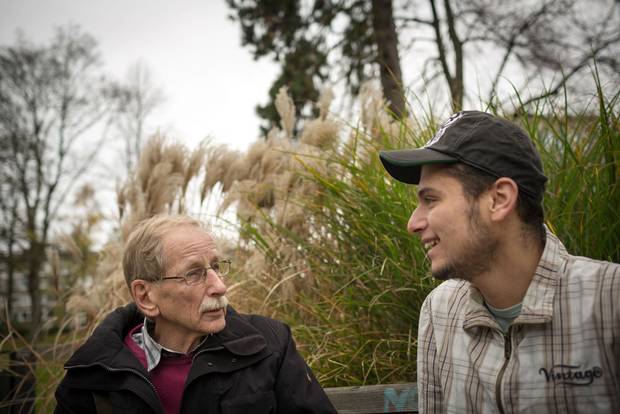
Max Saschowa (75) from Germany and Khaled Allak (22) from Syria. Here: during a walk in the park Stadtgarten in Essen
GORDON WELTERS/FOR THE GLOBE AND MAIL
A Frozen Trek to a Better Life
A few months ago, Max Saschowa was enjoying his retirement, spending time with his grandchildren and great-grandchildren and making occasional trips to Florida. On warm evenings, he and his wife Brigitte would host friends for dinner on their patio set in a lush garden with fields in the distance. He had never volunteered with refugees before – that is, until he learned they were just down the road.
When the refugees arrived in Loevenich, Mr. Saschowa drove to the dormitory reserved primarily for young men. He asked how he could help. "They eat three times a day, but they have nothing to do," he says, while sitting at a dark wood table overlooking his backyard. "They're so bored and it's very lonely there."
There was never a question in his mind that he would help. Born in 1940, Mr. Saschowa never met his father, a German soldier killed in France. After the Second World War, his mother struggled to make ends meet in a small town on the Baltic Sea that had been devastated by Russian forces advancing toward Berlin. Then, in February, 1947, seven-year-old Max set out on foot with his mother and older sister to reach a train that would take them to what would become West Germany.
They walked 40 kilometres along the coast in temperatures so cold that the water near the shore was frozen over. "I never forget – no, never," says Mr. Saschowa. Mr. Allak, who is sitting across the table, is transfixed as he listens to the story. "Like me," he says.
Mr. Saschowa ended up in the city of Braunschweig, where he remembers British soldiers bringing food to his school, including treats like chocolate and chewing gum. Even more precious were the weekly aid packets containing peanut butter. As a young man, he worked for a car dealer, then began importing Japanese motorbikes. He had a career he enjoyed, travelled widely and became a pilot in his spare time. But he never forgot his childhood scrabbling in the ruins of bombed-out buildings.
"These people have no future, only hope. They feel so alone," he says. "We have to help."
Mr. Saschowa drove his small black Volkswagen van to the refugee camp, loaded in six young men including Mr. Allak, and asked what they wanted to do. They suggested finding a café where they could smoke "shisha," or a water pipe, a ubiquitous pastime in Syria. Mr. Saschowa could barely pronounce "shisha," but he found a Turkish restaurant a 20-minute drive away that offered it. One evening in September, he took the young men there. For two hours, they drank sodas and smoked apple-flavoured tobacco.
Then he brought them back to his house at 9 p.m. "Honey, these are my friends," he announced to his surprised wife. He invited them to take whichever of his sweaters and jackets they might need. In the next weeks, the shisha evenings would be repeated twice more, and Mr. Allak would accompany Mr. Saschowa to an Asian buffet lunch. Faced with only the second Chinese meal of his life, Mr. Allak regarded the offerings warily, preferring to stick with chicken fingers and French fries.
There's not a lot of talking on these outings. But there is a sincere sense of fellow feeling, and in Mr. Saschowa's case, something else – a sense of returning the generosity he received as a child, of paying back an old debt.
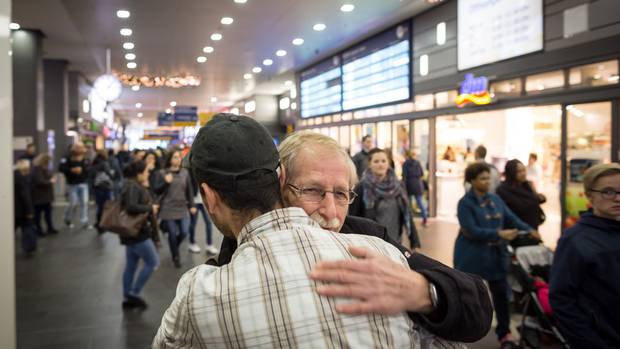
On the last day of October, Mr. Allak was transferred to another city about 100 kilometres away, where he was officially registered as an asylum seeker. Mr. Saschowa, meanwhile, has pledged to go help Mr. Allak wherever he ends up.
GORDON WELTERS/FOR THE GLOBE AND MAIL
Both Mr. Allak and Mr. Saschowa know this is only the beginning of a very long road. Even the dormitories rented to house the refugees in Loevenich are a temporary solution. By February or March, the temporary workers who harvest the fields will return, said Patrick Hangl of the social service organization ZOF, which runs the facilities on behalf of the local authorities. Asked where the refugees will go once the workers come back, Mr. Hangl responds with a kind of bemused shrug: No one knows.
On the last day of October, Mr. Allak was transferred to another city about 100 kilometres away, where he was officially registered as an asylum seeker. Although he is relieved to have started his asylum process, his new living quarters is a four-bedroom house that he shares with 25 other refugees. He wishes he were back in Loevenich, among the asparagus fields.
Mr. Saschowa, meanwhile, has pledged to help Mr. Allak wherever he ends up. As a retiree, he has time, and he loves to drive. "I'll go wherever he needs me," he says.
